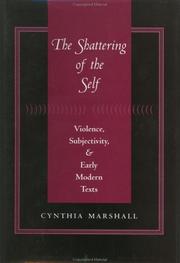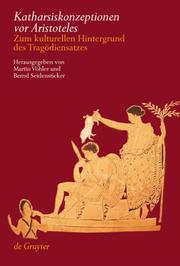| Listing 1 - 10 of 13 | << page >> |
Sort by
|
Book
ISBN: 3825377679 9783825377670 Year: 2018 Publisher: Heidelberg Universitätsverlag Winter
Abstract | Keywords | Export | Availability | Bookmark
 Loading...
Loading...Choose an application
- Reference Manager
- EndNote
- RefWorks (Direct export to RefWorks)

ISBN: 0801876435 9780801876431 0801867789 9780801867781 Year: 2002 Publisher: Baltimore Johns Hopkins University Press
Abstract | Keywords | Export | Availability | Bookmark
 Loading...
Loading...Choose an application
- Reference Manager
- EndNote
- RefWorks (Direct export to RefWorks)
Timely in its offering of an account that is both historically and psychoanalytically informed, The Shattering of the Self argues for a renewed attention to the place of fantasy in this literature and will be of interest to scholars working in Renaissance and early modern studies, literary theory, gender studies, and film theory.
Catharsis. --- Self in literature. --- Violence in literature. --- Renaissance --- Subjectivity in literature. --- English drama (Tragedy) --- English literature --- Abreaction --- Emotions --- Psychoanalysis --- Tragedy --- History and criticism. --- History and criticism

ISBN: 3110184338 9786612196195 1282196197 3110204282 9783110204285 9783110184334 Year: 2007 Publisher: Berlin ; New York : Walter De Gruyter,
Abstract | Keywords | Export | Availability | Bookmark
 Loading...
Loading...Choose an application
- Reference Manager
- EndNote
- RefWorks (Direct export to RefWorks)
Welche Modelle von Katharsis waren Aristoteles geläufig, in welchem Verhältnis stehen sie zueinander? Um den kulturellen Hintergrund der frühen Katharsiskonzeptionen zu erhellen, werden ihre Funktionsweisen in Biologie, Medizin, Ritus, Kultus, Musiktheorie, Psychologie und Philosophie untersucht, so dass die Voraussetzungen des poetologischen Begriffs deutlich werden. Which models of catharsis was Aristotle acquainted with, and what was the relationship between them? In order to illuminate the cultural background of early conceptions of catharsis, their functioning is examined in biology, medicine, ritual, cult, music theory, psychology and philosophy, thus to clarify the foundations for the concept in poetology.
Catharsis. --- Tragedy. --- Greek drama (Tragedy) --- Abreaction --- History and criticism. --- Aristotle. --- Aristoteles --- Aristote --- Aristotle --- Aristotile --- Drama --- Emotions --- Psychoanalysis --- Tragedy --- Arisṭāṭṭil --- Aristo, --- Aristotel --- Aristotele --- Aristóteles, --- Aristòtil --- Arisṭū --- Arisṭūṭālīs --- Arisutoteresu --- Arystoteles --- Ya-li-shih-to-te --- Ya-li-ssu-to-te --- Yalishiduode --- Yalisiduode --- Ἀριστοτέλης --- Αριστοτέλης --- Аристотел --- ארסטו --- אריםטו --- אריסטו --- אריסטוטלס --- אריסטוטלוס --- אריסטוטליס --- أرسطاطاليس --- أرسططاليس --- أرسطو --- أرسطوطالس --- أرسطوطاليس --- ابن رشد --- اريسطو --- Pseudo Aristotele --- Pseudo-Aristotle --- アリストテレス --- Catharsis --- History and criticism --- Views on tragedy. --- catharsis. --- poetics.
Book
ISBN: 0520965647 9780520965645 Year: 2017 Publisher: Oakland, California : University of California Press,
Abstract | Keywords | Export | Availability | Bookmark
 Loading...
Loading...Choose an application
- Reference Manager
- EndNote
- RefWorks (Direct export to RefWorks)
Mainstreaming Black Power upends the narrative that the Black Power movement allowed for a catharsis of black rage but achieved little institutional transformation or black uplift. Retelling the story of the 1960s and 1970s across the United States-and focusing on New York, Atlanta, and Los Angeles-this book reveals how the War on Poverty cultivated black self-determination politics and demonstrates that federal, state, and local policies during this period bolstered economic, social, and educational institutions for black control. Mainstreaming Black Power shows more convincingly than ever before that white power structures did engage with Black Power in specific ways that tended ultimately to reinforce rather than challenge existing racial, class, and gender hierarchies. This book emphasizes that Black Power's reach and legacies can be understood only in the context of an ideologically diverse black community.
Black power --- African American political activists --- African Americans --- History --- Politics and government --- 1960s. --- 1970s. --- activism. --- activist. --- african american. --- american history. --- atlanta. --- black community. --- black history. --- black mayors. --- black panther party. --- black politics. --- black power movement. --- black power. --- black rage. --- catharsis. --- city life. --- ideology. --- legacy. --- los angeles. --- mainstream. --- new york. --- people of color. --- self determination. --- united states. --- urban. --- us history. --- war on poverty.

ISBN: 1283058383 9786613058386 0226477541 9780226477541 9781283058384 6613058386 0226477657 9780226477657 0226477665 9780226477664 Year: 2000 Publisher: Chicago
Abstract | Keywords | Export | Availability | Bookmark
 Loading...
Loading...Choose an application
- Reference Manager
- EndNote
- RefWorks (Direct export to RefWorks)
Psychic trauma is one of the most frequently invoked ideas in the behavioral sciences and the humanities today. Yet bitter disputes have marked the discussion of trauma ever since it first became an issue in the 1870's, growing even more heated in recent years following official recognition of post-traumatic stress disorder (PTSD). In a book that is bound to ignite controversy, Ruth Leys investigates the history of the concept of trauma. She explores the emergence of multiple personality disorder, Freud's approaches to trauma, medical responses to shellshock and combat fatigue, Sándor Ferenczi's revisions of psychoanalysis, and the mutually reinforcing, often problematic work of certain contemporary neurobiological and postmodernist theorists. Leys argues that the concept of trauma has always been fundamentally unstable, oscillating uncontrollably between two competing models, each of which tends at its limit to collapse into the other. A powerfully argued work of intellectual history, Trauma will rewrite the terms of future discussion of its subject.
Psychic trauma. --- Traumatic neuroses. --- trauma, ptsd, psychoanalysis, sandor ferenczi, fatigue, shellshock, freud, multiple personality disorder, medicine, nonfiction, psychology, inheritance, suffering, pain, neurobiology, postmodernism, neuroses, dissociation, representation, world war ii, catharsis, william sargant, simulation, hysteria, hysterical, abram kardiner, imitation, memory, cure, treatment, literature.
Book
ISBN: 022609524X Year: 2018 Publisher: Chicago : University of Chicago Press,
Abstract | Keywords | Export | Availability | Bookmark
 Loading...
Loading...Choose an application
- Reference Manager
- EndNote
- RefWorks (Direct export to RefWorks)
Artists today are at a crossroads. With funding for the arts and humanities endowments perpetually under attack, and school districts all over the United States scrapping their art curricula altogether, the place of the arts in our civic future is uncertain to say the least. At the same time, faced with the problems of the modern world-from water shortages and grave health concerns to global climate change and the now constant threat of terrorism-one might question the urgency of this waning support for the arts. In the politically fraught world we live in, is the "felt" experience even something worth fighting for? In this soul-searching collection of vignettes, Patrick Summers gives us an adamant, impassioned affirmative. Art, he argues, nurtures freedom of thought, and is more necessary now than ever before. As artistic director of the Houston Grand Opera, Summers is well positioned to take stock of the limitations of the professional arts world-a world where the conversation revolves almost entirely around financial questions and whose reputation tends toward elitism-and to remind us of art's fundamental relationship to joy and meaning. Offering a vehement defense of long-form arts in a world with a short attention span, Summers argues that art is spiritual, and that music in particular has the ability to ask spiritual questions, to inspire cathartic pathos, and to express spiritual truths. Summers guides us through his personal encounters with art and music in disparate places, from Houston's Rothko Chapel to a music classroom in rural China, and reflects on musical works he has conducted all over the world. Assessing the growing canon of new operas performed in American opera houses today, he calls for musical artists to be innovative and brave as opera continues to reinvent itself. This book is a moving credo elucidating Summers's belief that the arts, especially music, help us to understand our own humanity as intellectual, aesthetic, and ultimately spiritual.
Spirituality in music. --- Music --- Moral and ethical aspects. --- Religious ethical aspects. --- music, art, houston grand opera, artistic director, humanities, affect theory, emotions, human spirit, joy, meaning, spirituality, catharsis, pathos, rothko chapel, classroom, china, curriculum, endowments, canon, education, nonfiction, funding, business, culture, fine arts, entertainment, creativity, technology, open access, conducting, wagner, mozart, handel, bach, classical.
Book
ISBN: 9780821446263 0821446266 0821446266 9780821423103 082142310X Year: 2018 Publisher: Athens, Ohio
Abstract | Keywords | Export | Availability | Bookmark
 Loading...
Loading...Choose an application
- Reference Manager
- EndNote
- RefWorks (Direct export to RefWorks)
Merleau-Ponty, Maurice, --- Passivite (psychologie) --- Passions (philosophie) --- Merleau-Ponty, Maurice --- Merleau-Ponty, Jean Jacques Maurice, --- Merlō-Ponty, Mōris, --- Ponty, Jean Jacques Maurice Merleau-, --- Ponty, Maurice Merleau-, --- מרלו־פונטי, מוריס, --- Âme, Passions de l' --- Passion (philosophie) --- Passions --- Passions de l'âme --- Passivité (philosophie) --- Pathos (philosophie) --- Catharsis --- Désir --- Émotions --- Páthos --- Raison --- Philosophie de l'homme --- Comportement passif --- Ajustement --- Personnalité passive-agressive --- Attitude --- Philosophie --- philosophie --- le mot grec --- psychologie
Book
ISBN: 1644690691 1644693801 1644690683 Year: 2020 Publisher: Boston, Massachusetts : Academic Studies Press,
Abstract | Keywords | Export | Availability | Bookmark
 Loading...
Loading...Choose an application
- Reference Manager
- EndNote
- RefWorks (Direct export to RefWorks)
This study is a theoretical reconsideration of the concept of the “tragic” combined with detailed analyses of Japanese literary texts. Inspired by contemporary critical discourse (especially the works by such thinkers as Theodor Adorno, Fredric Jameson and Raymond Williams), the author challenges both exotic and postmodern representation of Japanese culture as “the other” of the West. By examining the social backgrounds of artists’ endeavors to create new literary forms, the author unveils a rich tradition of tragic literature that, unlike the dominant local tradition of naturalism, has registered the unbridgeable gap between universal ideals and social values at a particular historical moment.
Tragic, The, in literature. --- Aristotle. --- Buddhism. --- Christianity. --- Daiichiji sengo-ha. --- Dainiji sengo-ha. --- Daisanji sengo-ha. --- Edo period. --- Hiroshima. --- Japanese literature. --- Kamakura. --- Marxism. --- Meiji period. --- Muromachi. --- Nagasaki. --- Oriental. --- Qin dinasty. --- Shintoism. --- Taisho. --- Taoism. --- Tokugawa period. --- World War II. --- aesthetics. --- allegory. --- ambiguity. --- androgyny. --- anthropology. --- anti-pastoral. --- atomic bomb. --- bunka. --- capitalism. --- catharsis. --- classical Japanese theater. --- colonialism. --- comparative literature. --- critical theory. --- exoticism. --- feminism. --- haiku. --- imperialism. --- industrialization. --- mimesis. --- modernism. --- multiculturalism. --- naturalism. --- othering. --- phenomenology. --- poetry. --- post-structuralism. --- postmodernism. --- postwar. --- realism. --- socialism. --- tragedy. --- trauma. --- universalism.
Book
ISBN: 9781644690697 1644690691 9781644690680 1644690683 1644693801 Year: 2020 Publisher: Boston, MA
Abstract | Keywords | Export | Availability | Bookmark
 Loading...
Loading...Choose an application
- Reference Manager
- EndNote
- RefWorks (Direct export to RefWorks)
This study is a theoretical reconsideration of the concept of the “tragic” combined with detailed analyses of Japanese literary texts. Inspired by contemporary critical discourse (especially the works by such thinkers as Theodor Adorno, Fredric Jameson and Raymond Williams), the author challenges both exotic and postmodern representation of Japanese culture as “the other” of the West. By examining the social backgrounds of artists’ endeavors to create new literary forms, the author unveils a rich tradition of tragic literature that, unlike the dominant local tradition of naturalism, has registered the unbridgeable gap between universal ideals and social values at a particular historical moment.
Tragic, The, in literature. --- Aristotle. --- Buddhism. --- Christianity. --- Daiichiji sengo-ha. --- Dainiji sengo-ha. --- Daisanji sengo-ha. --- Edo period. --- Hiroshima. --- Japanese literature. --- Kamakura. --- Marxism. --- Meiji period. --- Muromachi. --- Nagasaki. --- Oriental. --- Qin dinasty. --- Shintoism. --- Taisho. --- Taoism. --- Tokugawa period. --- World War II. --- aesthetics. --- allegory. --- ambiguity. --- androgyny. --- anthropology. --- anti-pastoral. --- atomic bomb. --- bunka. --- capitalism. --- catharsis. --- classical Japanese theater. --- colonialism. --- comparative literature. --- critical theory. --- exoticism. --- feminism. --- haiku. --- imperialism. --- industrialization. --- mimesis. --- modernism. --- multiculturalism. --- naturalism. --- othering. --- phenomenology. --- poetry. --- post-structuralism. --- postmodernism. --- postwar. --- realism. --- socialism. --- tragedy. --- trauma. --- universalism.
Book
ISBN: 1479855928 9781479855926 9781479802074 1479802077 9781479811991 1479811998 Year: 2019 Publisher: New York
Abstract | Keywords | Export | Availability | Bookmark
 Loading...
Loading...Choose an application
- Reference Manager
- EndNote
- RefWorks (Direct export to RefWorks)
The first edition of Film as Religion was one of the first texts to develop a framework for the analysis of the religious function of films for audiences. Like more formal religious institutions, films can provide us with ways to view the world and the values to confront it. Lyden argues that the cultural influence of films is analogous to that of religions, so that films can be understood as representing a "religious" worldview in their own right. Thoroughly updating his examples, Lyden examines a range of film genres and individual films, from The Godfather to The Hunger Games to Frozen, to show how film can function religiously.
Motion pictures --- Moral and ethical aspects. --- Religious aspects. --- Action Film. --- Aliens. --- Attitudes. --- Audience Reception. --- Autonomy. --- Backlash. --- Beliefs. --- Catharsis. --- Circuit of culture. --- Civilization. --- Clifford Geertz. --- Communitas. --- Cultural Studies. --- Death. --- Discernment. --- Disenfranchised. --- Disney. --- Diversity. --- Dualism. --- Dystopia. --- Evaluation. --- Fascism. --- Fear. --- Feminism. --- Functionalist. --- Gangster. --- Genre. --- Heroism. --- Heterosexual. --- Ideal. --- Implied Viewer. --- Influence. --- Interreligious Dialogue. --- Irrational. --- Liminal Power. --- Liminal. --- Liminality. --- Melodrama. --- Metonymy. --- Models for Reality. --- Models of Reality. --- Monstrous. --- Moral Values. --- Norms. --- Popular Culture. --- Primitive. --- Projection. --- Reductionism. --- Relationships. --- Representation. --- Robots. --- Romantic. --- Sacrifice. --- Sexist. --- Sexuality. --- Status Quo. --- Subordination. --- Suffering. --- Superhero. --- Trends. --- Utopia. --- Values. --- Vietnam War. --- Violence. --- War on Terror. --- Western. --- Religious aspects --- Moral and ethical aspects
| Listing 1 - 10 of 13 | << page >> |
Sort by
|

 Search
Search Feedback
Feedback About UniCat
About UniCat  Help
Help News
News